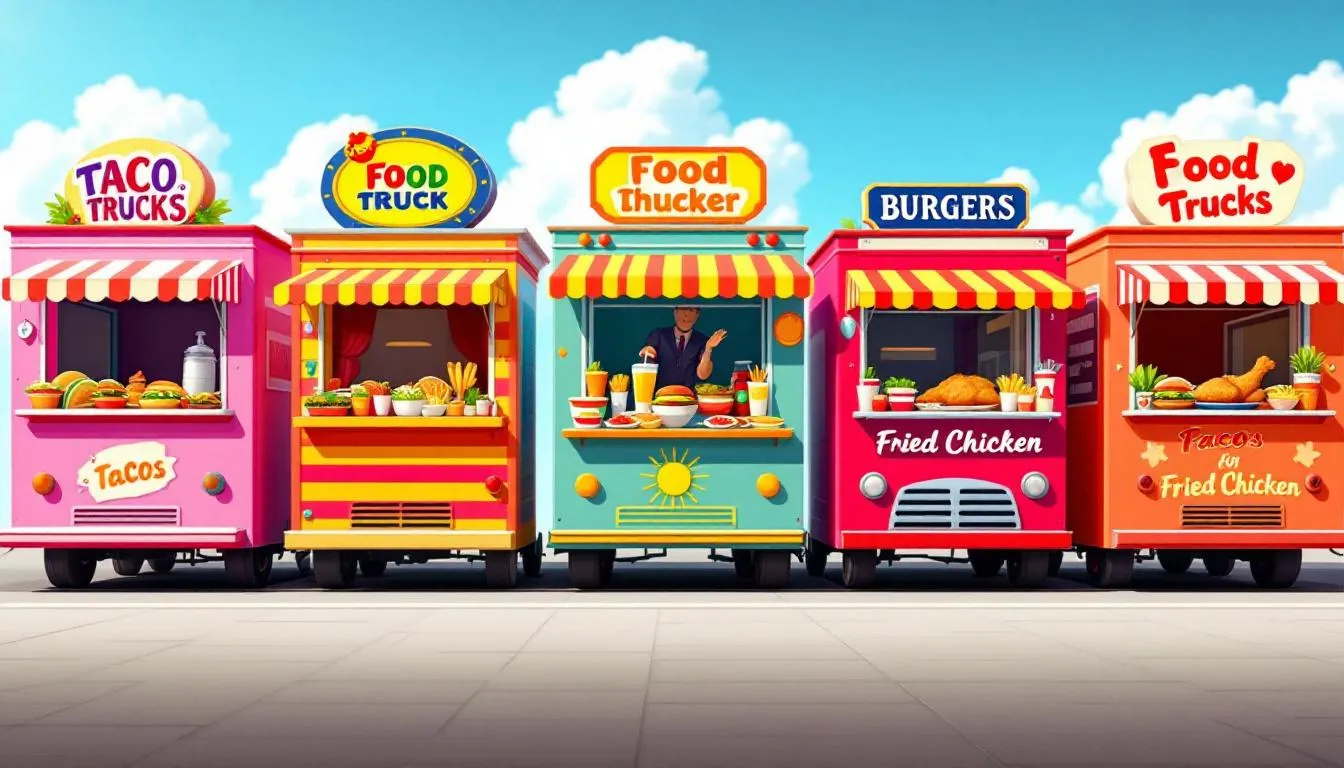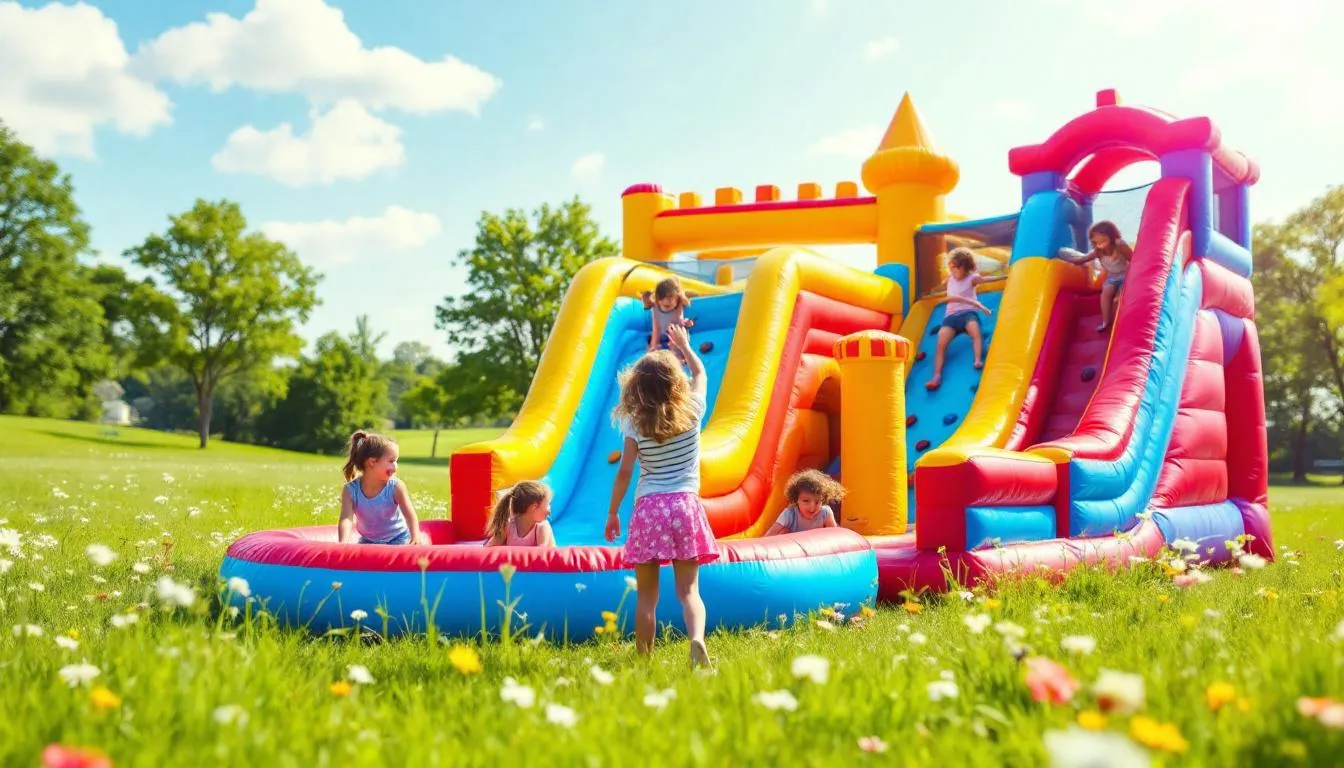Company Picnic 2025: The Ultimate Guide to Pulling Off the Perfect Team-Building Event
Published on 12.08.2025In 2025, with the war for talent at its peak, companies are looking for fresh ways to boost team engagement and strengthen culture. A company picnic isn’t just a party—it’s an event that’s a brilliant way to bring people together, mixing a laid-back vibe with business goals and delivering real benefits for your company.
Research shows companies that run regular team-building events in Poland or at home, see 31% higher employee retention and 22% better team performance. Pulling off a great company picnic takes thoughtful planning and commitment.
A well-run company picnic isn’t just fun—it’s a strategic project that tightens team bonds and boosts your employer image.
This complete guide walks you through every step of planning a company picnic, from concept to execution, so your 2025 event is a hit.
Planning an unforgettable celebration? Explore Party Catering Price List - 2025 Guide to Prices and Services for expert recommendations, sample packages, and everything you need to organize a tasty and well-managed event in 2025.
What is a company picnic and why bother with one?
A company picnic is an outdoor event a company throws for its employees, often including their families and business partners. In a relaxed setting, it blends fun, bonding, and team-building—perfect for getting to know each other outside of work.
Company picnics are among the most popular outdoor events companies put on.
Want a high-performing and committed team? Explore Motivating and Engaging Employees - Complete Guide for Modern Managers for practical advice, powerful engagement methods, and real-world solutions to the most common management challenges.
.jpg)
Business benefits of a company picnic
Hosting a company picnic is a great way to improve communication and bond the team. It delivers tangible wins for the business:
Better communication – the informal vibe makes it easy for people at all levels to chat, which turns into smoother day-to-day collaboration.
Higher employee engagement – people feel appreciated, which boosts motivation and loyalty.
Stronger team bonds – shared experiences through games and activities build lasting relationships.
Employer branding – when your people have a great time, they naturally become brand ambassadors.
Impact on your image as an attractive employer
In the age of social media, internal events have serious promo potential. A themed picnic that lands well creates positive buzz and catches the eye of future hires. Happy attendees become brand ambassadors. Companies that invest in their people’s wellbeing build a reputation as responsible employers—and that glow spills over to how customers see your brand, too.
Ever wondered about the purpose of integration events? Learn why [team bonding outside the office] changes how employees see their boss, creates real connections, and boosts workplace morale. Dive deeper into [the value of informal team meetings] for company success
How a company picnic differs from other corporate events
Unlike formal conferences or galas, a company picnic is the go-to outdoor integration event for many firms. It stands out with:
An outdoor setting and a relaxed vibe
Families joining in
A variety of attractions for all age groups
More emphasis on bonding than on presenting results
Lower barriers to participation
Company picnic effectiveness stats
The latest HR market research in Poland shows:
78% of employees consider integration events an important benefit
Companies that host regular picnics report 25% lower turnover
65% of attendees say they have better relationships with their supervisors
The average ROI from company picnics is 340%
Planning a company picnic step by step
Success hinges on planning ahead. Putting together a company picnic means stitching lots of moving parts into one smooth experience so every stage connects and people feel comfy and engaged. A pro approach means being systematic and covering every angle.

Define the event goals
Before you dive in, be clear about what you want to achieve:
Team bonding – meeting people across departments, building informal relationships, shared experiences. Strong internal relationships are key to success.
Motivation and appreciation – celebrate wins, recognize hard work, boost belonging.
Celebrate milestones – company anniversaries, hitting sales targets, wrapping big projects.
Client relations – use the event to connect with business partners and clients. It’s also a great way for your team and partners to bond and build lasting ties.
Set the budget
When you plan the budget, account for all key cost buckets:
Category | Share of budget | Cost per person |
|---|---|---|
Venue and infrastructure | 20% | 30-80 zł |
Catering | 30% | 45-120 zł |
Attractions and entertainment | 25% | 40-100 zł |
Transport | 10% | 15-40 zł |
Other costs | 15% | 20-60 zł |
Total budget per attendee ranges from 150 up to 1000 zł, depending on the standard and headcount. Track the budget throughout prep to avoid surprises and keep costs under control.
Pick the best date
The sweet spot in Poland is May–September, when the weather plays nice. When locking the date, avoid:
Peak vacation months (July–August)
Long May weekends
Industry crunch times
Clashes with key industry events
Build the organizing team
Set up a crew with clear roles. Work as one across all prep stages so you can tailor everything to attendees’ needs:
Project lead - coordinates the whole show
Logistics lead - venue, transport, infrastructure
Program coordinator - attractions, acts, activities
Catering manager - tasty food and service
Safety specialist - safeguards, H&S procedures
Planning timeline
For larger companies, plan 3–6 months out:
6 months out:
Define goals and budget
Pick a date and shortlist venues
4 months out:
Book the venue
Select key vendors (catering, attractions)
2 months out:
Finalize the program
Start internal comms
1 month out:
Confirm headcount
Lock final details with vendors
Choosing the location and infrastructure
The venue is the foundation of your event. Warsaw is one of the top choices for company picnics thanks to its location, infrastructure, and loads of attractions. The right spot shapes attendee comfort, programming options, and the overall vibe—and lets people enjoy a variety of activities.

Venue selection criteria
Accessibility - easy by public transport and car. Ideally no more than 45 minutes from the city center.
Parking - aim for at least one space per two adults. For 200+ people, consider shuttle buses.
Sanitary facilities - at least one toilet per 25 attendees, plus accessible options and baby changing tables.
Safety - check access control, fencing, and distance from busy roads—especially important with kids around.
Popular locations in Poland
City parks - natural setting in town, but need permits and have noise limits. Cost: 2–8 zł/m²/day.
Resorts - full food and tech support, pro service. Cost: 15–50 zł/person for space.
Hotels with green areas - high service standard, indoor backup, possible lodging for out-of-towners. Cost: 30–80 zł/person.
Stadiums and sports venues - great for sound and stage, pro tech facilities. Cost: 25–60 zł/person.
Technical requirements
Power - minimum 32A per 100 people for basic sound and lighting. Larger events may need generators.
Stage and sound - for 150+ attendees, get a professional stage with a sound system of at least 2 kW.
Lighting - crucial if you go past dusk. Light up walkways and food zones.
Plan B for bad weather
Tents - popular rain backup; rental: 8–15 zł/m²/day.
Conference rooms - hotel or resort backup, typically 50% less capacity than outdoors.
Shelters - fixed roof structures in parks/resorts; book early.
Catering for a company picnic
Great catering for company events is one of the biggest success factors. You can tailor the menu to your crowd for a standout food experience. Quality eats drive satisfaction and stick in people’s memory long after the event.

Food options
Food trucks - the hottest pick in 2025, lots of variety and great presentation. Cost: 45–65 zł/person.
Live grill - a picnic classic, meat and veg cooked in front of guests. Cost: 35–55 zł/person.
Outdoor buffet - traditional setup with a wide spread; needs cover. Cost: 40–70 zł/person.
Themed stations - world cuisines in one place (Italian, Asian, Mexican). Cost: 50–80 zł/person.
Popular 2025 menus
Food trends for 2025 company picnics:
Fun menu ideas grab attention and make the event more appealing.
Craft burgers - local beef, blue cheese, caramelized onions
Neapolitan pizza - baked in mobile wood-fired ovens
Asian bites - ramen, bao buns, sushi rolls
Zero-alcohol cocktails - smoothies, lemonades, kombucha
Catering for special diets
Modern catering must cover diverse dietary needs:
Vegetarian - 15–20% of the menu
Vegan - at least 10%
Gluten-free - clearly labeled for coeliacs
Allergens - list allergens for every dish
Setting up food stations
Serving schedule - stagger service to avoid long lines:
12:00–13:00 - starters and snacks
13:30–15:00 - mains
15:30–17:00 - desserts and coffee
Queue management - space stations at least 10 meters apart; use tickets or department time slots.
Hygiene and safety - provide hand-sanitizing stations at every point; keep chilled items below 6°C.
Attractions and entertainment for everyone
The right attractions are the heart of a great picnic. Make sure there’s something for every age—from little kids to adults. A broad program gets everyone involved, sparks fun, and helps people connect.
Explore corporate rewards programs in Poland and get insider tips for planning [team building experiences] in Warsaw, Krakow, Gdansk, and beyond. This [comprehensive incentive travel guide] covers budget solutions, cultural immersion activities, and proven strategies to boost employee motivation.
Attractions for kids
A company picnic is a perfect way to bring employees and their families together and build a positive vibe. Kids need dedicated, safe, and engaging options.

Bouncy castles and slides are the most popular pick for family picnics. When choosing inflatables, check:
Safety certificates and technical approvals
Proper anchoring per manufacturer guidelines
Operation by trained staff
Age/height-based zones
Rental cost: 300–800 zł/day per unit, depending on size.
Entertainers and workshops keep kids busy:
Face painting - 150–250 zł/entertainer/day
Movement games run by pros
Age-appropriate prize contests
Creative workshops - origami, clay modeling
Toddler zone - a dedicated area for the youngest:
Tent with changing table and feeding chairs
Toys for different age groups
Quiet spot for breastfeeding moms
Qualified caregivers
Educational attractions mix learning with fun:
Petting mini-zoo with safe animals
Science shows - chemistry and physics experiments
Eco-friendly arts and crafts
Entertainment for adults
Adult attendees need activities to unwind and meet new people across the team. Pick attractions that draw them into the fun.
Team sports are perfect for bonding:
XXL table football - 400–600 zł/day
Bubble football - football in inflatable balls, 800–1200 zł/day
Volleyball and badminton - classics
Ultimate frisbee - a modern twist
Skill games to test your mettle:
Foot dart - kick a ball at an inflatable dartboard
Disc golf - obstacle course with flying discs
Obstacle course for adults with timekeeping
VR simulators - cutting-edge experiences
Extreme attractions for adrenaline lovers:
Climbing wall with instructor - 500–800 zł/day
Bungee trampolines - 600–900 zł/day
Driving simulators - 800–1500 zł/day
Quiz contests for a mental workout:
Company quiz about your history and values
Family Feud-style game tailored to your industry
Karaoke with age-appropriate playlists
Entertainment program and live acts
A professional line-up turns your picnic into a real event people remember. A concert by a well-known artist can be the evening headliner, boosting the fun factor and team bonding.
Performances by Polish music stars
Cover bands - a safe bet with crowd-pleasers:
Cost: 5,000–15,000 zł per show
Set length: 45–60 minutes
Tech needs: stage min. 6×4 m, 2 kW sound
Pop and rock artists - recognizable names lift the event’s profile:
Cost: 20,000–50,000 zł depending on popularity
Technical rider - detailed stage and service requirements
Backstage - dedicated artist area
Comedy and stand-up
Make sure the humor fits your company and crowd:
Preview the set before booking
Avoid hot-button politics and religion
Cost: 3,000–12,000 zł for a cabaret act
Stand-up: 2,000–8,000 zł per performance
Dance, acrobatic, and laser shows
Dance shows - from traditional to modern:
Polish folklore - 1,500–3,000 zł
Contemporary dance - 2,000–4,000 zł
Show dance with special effects - 3,000–6,000 zł
Acrobatics - spectacular performances:
Aerial acrobatics - 2,500–5,000 zł
Fire shows (with proper safeguards) - 1,500–3,500 zł
Laser shows - a modern finale:
Cost: 4,000–8,000 zł
Needs darkness - perfect for evening
Meet & Greet with artists
Photo and autograph sessions with the stars:
Set up a branded photo zone
Schedule meet-and-greet slots
Prepare branded souvenir photos
Team-building games and scenarios
Well-planned integration games are the heart of a picnic, letting people connect informally and build lasting professional relationships. Give attendees plenty of options to join in and get involved.

Innovative team-building scenarios are popping up more and more at company picnics, spicing things up and encouraging people to play together.
Themed scenarios
“Reksio on his own” - a scenario inspired by a beloved cartoon:
Attendees split into teams representing different characters
Puzzle-solving and collaboration tasks
Great for companies with a younger crew
“Pimp Your Ride” - automotive theme for mobility brands:
Workshop stations with manual tasks
Car trivia contests
Tuning cardboard car models
“Mega Game Show” - based on popular TV formats:
Questions about the company, industry, and pop culture
Points system and cool prizes
Hosted by a professional MC
Outdoor team building
Outdoor escape room - mobile puzzles in nature:
Cost: 100–180 zł/person
Duration: 60–90 minutes
Groups of 6–8 for best engagement
Corporate geocaching - a modern treasure hunt:
Use mobile apps
Tasks linked to company history
Combines tech with physical activity
Paintball for adrenaline fans:
Professional field with obstacles
Safety briefing
Cost: 40–60 zł/person per session
Team contests with company prizes
Run contests that promote your company values:
Best department showcase - creative intros from each team
Company quiz - history, achievements, future plans
Sports tournament - rotating games across departments
Prizes should be on-brand but practical:
Tech gadgets with your logo
Vouchers for shopping or experiences
Extra days off
Creative workshops
Build-a-raft - collaborating to create structures from natural materials:
Boosts creativity and planning
The result can double as office decor
Materials cost: 15–25 zł/person
Culinary workshops - cooking together outdoors:
Prep simple grill dishes
Contest for the best team recipes
Taste each other’s creations
The role of professional hosts
Experienced entertainers keep everything flowing:
Moderation - linking and running activities
Motivation - nudging everyone to join in
Safety - watching the rules
Creativity - adapting to the group
Cost for pros: 200–400 zł/person/day.
Organizational and logistics essentials
Solid logistics are the base for a safe, comfortable picnic. With proper safeguards in place, people can focus on fun and bonding.
Medical cover
Lifeguard/medic on site - required for events over 300 people:
Paramedic with WOPR or equivalent qualifications
Cost: 400–600 zł/day per medic
Medical point with basic kit
First aid kit - stocked per standards:
Dressings, bandages, disinfectants
Painkillers and anti-allergy meds
Basic immobilization gear
Emergency procedures - set up in case of serious issues:
Emergency numbers clearly displayed
Designated contact person
Access map for emergency services
Security and safety
Entry control keeps everyone safe:
Guest list with ID verification
Security at the main gate - 150–200 zł/8h
Wristbands or badges for attendees
Monitoring the event area:
Cameras at key points
Patrolling security
Lighting on all pathways
Evacuation plan - prepared for different scenarios:
Marked emergency exits
Procedures for threats
Assembly points at a safe distance
Sanitary facilities
Toilets in the right number and standard:
At least one cubicle per 25 attendees
Separate accessible toilets
Running water and soap
Changing tables for families with little ones:
In women’s restrooms and a separate area
Stocked with basic hygiene items
Bin for used diapers
Hygiene stations placed strategically:
Hand sanitizer dispensers
At food zone entrances
Near kids’ attractions
Transport
Buses for big groups:
Cost: 5–8 zł/km for a 50-seater
Book at least 1 month ahead
Routes planned around your office locations
Parking coordination for those driving:
Signposted parking zones
Traffic marshal during peak hours
Overflow parking options
VIP transport - for execs and key guests:
Chauffeured vehicles
Direct access to the VIP area
Coordinated arrival schedule
Cleaning during and after the event
Keeping it clean during the event:
Bins every 20–30 meters
Roaming cleaning crew
Waste sorting per your environmental policy
Post-event clean-up:
Dismantle all temporary structures
Dispose of waste in proper containers
Restore the area to its original state
Event communication and promotion
Great comms drive attendance and engagement. A smart promo plan builds anticipation and boosts turnout.
Explore actionable insights with the complete guide to planning away days that boost team collaboration, morale, and communication. Learn how to choose the best venues, design engaging programs, and avoid common pitfalls in [corporate team building events].
Internal communication strategy
Emails - your core info channel:
Save the date - 2 months before
Official invite with program - 1 month before
Reminder with practical info - 1 week before
Follow-up with thanks and photos - after the event
Company intranet - your central hub:
Dedicated section with picnic updates
Registration form for attendees
FAQ with common questions
Photo gallery from previous editions
Office posters - old-school but effective:
Place them in high-traffic spots
Eye-catching graphics with key info
QR code for online registration
Invites for families and business partners
Employee families receive special invites:
Highlight that kids are welcome
List attractions by age group
Practical tips on travel and parking
Business partners - clients and vendors:
Elegant invites to stress the event’s importance
Info on networking opportunities
A dedicated program for business guests
Using social media
Live coverage on the day:
A designated company hashtag for all posts
A crew handling live tweeting and Instagram Stories
Encourage attendees to share their own posts
Pre-event campaign:
Teasers with program and attractions
Introduce artists and headliners
Countdown to the big day
Promo materials
Company swag as souvenirs:
T-shirts with the event logo and year
Eco tote bags to take goodies home
Thermal mugs with event graphics
Roll-ups and on-site branding:
Pro setups at the entrance
Consistent visual identity across the site
Photo zones with your logo backdrop
Photo and video coverage
Event photographer - professional coverage:
Cost: 800–2500 zł per day
Reportage of all key moments
Group shots of teams and leadership
Videographer - promo material for later:
Short highlight video
Attendee interviews
Assets for recruitment
Budget and costs
Budgeting a company picnic means knowing the costs of every element. Allocate funds smartly to maximize satisfaction without overspending.
Cost structure
Professional planning should include all spending categories:
| Share | Description | Cost per person |
|---|---|---|---|
Venue | 20% | Venue rental, basic infrastructure | 30-80 zł |
Catering | 30% | Meals, drinks, service | 45-120 zł |
Attractions | 25% | Inflatables, games, live acts | 40-100 zł |
Transport | 10% | Buses, parking, VIP transport | 15-40 zł |
Other | 15% | Safety, coverage, swag | 20-60 zł |
Per-person budget by event standard
Basic standard (200–300 zł/person):
Venue: city park or your own grounds
Catering: basic grill menu
Attractions: inflatables, team games
Program: DJ, simple contests
Mid-range (250–500 zł/person):
Venue: resort
Catering: food trucks with variety
Attractions: broad mix for kids and adults
Program: live band, entertainers
Premium (500–1000 zł/person):
Venue: hotel with full facilities
Catering: full-service catering with waitstaff
Attractions: unique experiences, VR, extreme
Program: star performer, professional show
Ways to optimize costs
Negotiate packages with vendors:
Bundle services with one vendor
Early-booking discounts
Share artist transport costs across events
Use internal resources:
Tap into in-house talent
Use company transport for small groups
Employee volunteers to support
Sponsorships and partnerships:
Work with local businesses
Barter services with partners
Sponsor promo materials
Co-funding and sponsorship
Business partners - your clients may cover part of the costs in exchange for:
Product showcases
Branding on promo materials
Access to employees as potential customers
Local vendors often offer attractive packages:
Nearby restaurants - special menus
Local bands - lower travel costs
Event agencies - strong reference portfolios
Company picnic ROI
Measure employee satisfaction:
Post-event surveys with NPS
Compare with last year
Analyze attendance and engagement
Impact on retention:
Track attrition in the months after the event
Correlate attendance with loyalty
Savings on recruitment costs
Calculate ROI:
Average company picnic ROI is 340%
Reduce turnover costs by 25%
Increase team productivity by 15–20%
Most common mistakes when organizing company picnics
Dodging common pitfalls is key. Knowing the usual mistakes helps you spot and fix them early.

No link to your employer branding strategy
The problem: Treating the picnic as a one-off, disconnected from your values and culture.
The fix:
Tie the picnic goals to your long-term HR strategy
Use the event to communicate your mission and vision
Link the program with employee development initiatives
Underestimating the number and ages of kids
The problem: Too few kid-friendly attractions or not age-appropriate.
The fix:
Survey employees about preferences
Split attractions by age groups (0–3, 4–8, 9–12)
Plan 1.5 attractions per attending child
No real bad-weather backup
The problem: No alternative plan in case of rain or extreme weather.
The fix:
Have cover for at least 80% of attendees
Pre-book conference rooms as a fallback
Insure the event for weather risks
Cutting corners on catering quality
The problem: Going cheapest and leaving people unhappy.
The fix:
Allocate at least 30% of the budget to catering
Do a tasting beforehand
Check vendor references from past events
Stale repeating the same attractions
The problem: No innovation—copy-pasting last year.
The fix:
Introduce at least 30% new attractions each year
Track event-industry trends
Collect feedback and implement suggestions
Poor communication and promotion
The problem: Late or dull messaging leads to low turnout.
The fix:
Start comms at least 2 months before
Use multiple channels - email, intranet, social
Create attractive promo materials with the program
No vendor market comparison
The problem: Booking the first available vendor without comparing offers.
The fix:
Collect at least 3 offers from different suppliers
Check references and project portfolios
Negotiate terms and customization
Trends in company picnics for 2025/2026
The event world keeps evolving to match changing expectations and social trends. Leaning into new trends is a great way to stand out. 2025 brings plenty of innovations to company picnics.
Sustainability - eco-friendly solutions
Zero waste - cut single-use waste:
Reusable plates and cutlery instead of plastic
Water refill stations instead of bottled water
Compostable food packaging
Waste sorting with attendee education
Local suppliers - reduce your footprint:
Catering with local produce within 50 km
Regional artists and bands
Promo materials from local printers
Partner with local environmental groups
Carbon offset:
Calculate the event’s CO2 emissions
Plant trees to offset
Invest in renewables
Tell attendees about your green actions
Tech that upgrades events
Event apps - your central attendee hub:
Interactive, personalizable schedule
Map with attraction and service locations
Real-time attraction ratings
Chat for attendees and networking
Cashless payments:
RFID wristbands for add-on purchases
Mobile app integration
Secure, fast transactions
Spending analytics
VR/AR - virtual and augmented experiences:
Virtual tours of company offices in other cities
AR games tied to company history
Job simulators for employees’ families
Futuristic experiences as premium attractions
Wellness and wellbeing
Relax zone - downtime in nature:
Hammocks and loungers in the shade
Mindfulness area with an instructor
Water features and natural elements
Quiet space for introverts
Massages and therapies - pro wellness services:
Chair massages for desk workers
Consults with an ergonomics expert
Blood pressure and basic health checks
Workshops on healthy living
Physical activity - get people moving:
Outdoor yoga
Nordic walking
Stretching after long hours at a desk
Sports contests that promote healthy competition
Hybrid events
Online streams for remote employees:
Live stream key acts and contests
Virtual participation in games and quizzes
Picnic packs delivered to homes
Integrate online chat with on-site activities
Interactivity between online and on-site:
Joint voting for the best presentations
Quizzes for both groups
Experience sharing across company locations
Group photos via video link
Personalizing the experience
Match your team’s demographics:
Analyze age, interests, and preferences
Different activity tracks for different groups
Options for introverts and extroverts
Include cultural diversity
Individual preferences:
Let people pre-book specific attractions via the app
Personal schedules for attendees
Menu tailored to diets and restrictions
Flexible participation options (full day vs. shorter)
Measuring success and follow-up
Evaluating the event properly lets you keep improving and maximize its cultural impact.
Discover the benefits of working with a corporate event agency in Poland for your business meetings, conferences, and team building activities. This [complete guide to professional event management services] covers everything from venue selection and logistics to unique incentive programs and cost-saving strategies.
Satisfaction surveys
Net Promoter Score (NPS) - a key success metric:
Question: “How likely are you to recommend our company picnic to friends at other companies?”
Scale 0–10 with detractors, passives, promoters
Goal: NPS above 50 for a successful event
Rate specific elements:
Catering (food quality, variety, service)
Attractions (age fit, availability, quality)
Location (access, comfort, safety)
Entertainment program (level, audience fit)
Organization (comms, logistics, punctuality)
How to collect feedback:
Online survey within 48 hours
QR codes at the exit
Quick interviews with a representative sample
Ratings inside the event app
Engagement analysis
Attendance - your primary success metric:
% of employees attending vs. invited
Analyze reasons for no-shows
Compare with previous years
Target: at least 70% attendance for large companies
Social media activity:
Number of posts with your hashtag
Organic reach of event content
Sentiment analysis of attendee posts
Growth in followers on company accounts
Participation in activities:
Uptake in contests and team games
Time spent at different attractions
Number of photos taken in photo zones
Event app usage
Impact on HR metrics
Employee retention:
Compare attrition 6 months before vs. after
Analyze correlation between attendance and loyalty
Assess reasons for staying
Rate the picnic as an employee benefit
Sick leave:
Track absences in the months after
Impact on wellbeing and morale
Analyze stress and burnout
Cost savings on sick days
Work atmosphere:
Climate surveys before and after
Interdepartmental relations
Internal communication and information flow
Collaboration on cross-functional projects
Wrap-up report
Cost analysis - detailed budget review:
Planned vs. actual spend
Identify categories that overshot
Cost per participant across segments
Recommendations to optimize next time
Goals achieved - check against your targets:
Degree of team-bonding goals met
Satisfaction by attendee group
Impact on employer branding
Event ROI in both numbers and sentiment
Recommendations for next time:
Top-rated elements to repeat
Areas to improve
New trends to try next edition
Optimal scale and budget for future events
Planning the next events
Event cadence - a strategic approach:
Define optimal frequency (annual, semi-annual)
Align with company and industry calendars
Build tradition and brand recognition
Evolve the format based on feedback
Build a knowledge base:
Document best practices from each event
Database of vetted suppliers and vendors
Templates for comms and promo assets
System for managing contacts and contracts
Continuous improvement:
Regularly review the organizing process
Benchmark against other companies and events
Invest in the team’s development
Adopt new tech and trends
A company picnic in 2025 and 2026 is a strategic tool for building culture that, when planned right, delivers clear business results. The key is a holistic approach that considers everyone’s needs, market trends, and your organizational goals.
Explore actionable insights for selecting an event organization partner] and mastering event planning best practices. Dive into specifics about [corporate event services], vendor management, and building successful client relationships for every event.
Remember: a great chance to bond the team takes pro prep, but the payoff—stronger working relationships, higher engagement, and a better employer brand—is worth it. Invest in quality, and your company picnic will be the event everyone looks forward to all year.